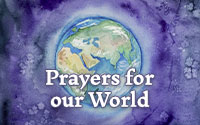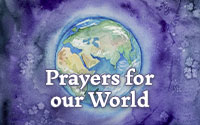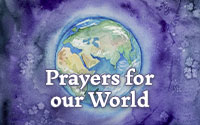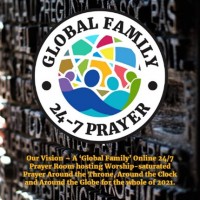Israel: Elections / Ceasefire under threat
Psalm 122:6 tells us to pray for the peace of Jerusalem. Currently Israel is undergoing significant upheaval whilst still facing threats from Palestinians in Gaza.
Having seen 11 days of relative peace following a ceasefire agreed between Israeli and Palestinian forces, the Israeli military confirmed an aircraft attack in the Gaza Strip on Wednesday 16th June, retaliating against incendiary balloons deployed by Hamas.
The attack comes barely two days after the ousting of Israel's former Prime Minister Benjamin Netanyahu. The attack reportedly targeted Hamas armed compounds in response to incendiary balloons that were deployed from the area. The balloons caused 10 fires in fields of southern Israel, Reuters reported.
 An unwieldy coalition calling itself “Change” has removed Benjamin Netanyahu, Israel’s longest-serving prime minister, after his most recent 12-year run. The eight-party coalition ranges from ultra-right religious nationalists to the secular hard-right, through the centre-right and residue of Israel’s left, to ally for the first time with an Arab Islamist party.
An unwieldy coalition calling itself “Change” has removed Benjamin Netanyahu, Israel’s longest-serving prime minister, after his most recent 12-year run. The eight-party coalition ranges from ultra-right religious nationalists to the secular hard-right, through the centre-right and residue of Israel’s left, to ally for the first time with an Arab Islamist party.
The new government will be led initially by Naftali Bennett, a champion of Jewish settlement. He is opposed to any Palestinian state and wants to annex most of the occupied West Bank and stands to the right of Netanyahu.
Yair Lapid, a former TV anchor and voice of liberal secular Israelis, whose party came second to Netanyahu’s Likud, is supposed to take over from Bennett as premier in 2023 and has provided what glue the coalition has.
Netanyahu’s removal from office has been met with dismay by some evangelical Christian groups whilst others have reaffirmed their support for Israel and a desire to stay out of day-to-day politics.
Meanwhile, Netanyahu continues to challenge the legitimacy a the newly formed Israeli coalition, calling it the result of “the greatest election fraud” in the history of democracy.
Pray: that His peace may reign over the land of Israel (Psalm 122:6)
Pray: for Naftali Bennett as the new leader of the Israeli Government. Pray@ that God will Provide him and the Government with the knowledge needed during these most difficult of times.
Pray: that the ceasefire may endure and that a peaceful resolution to this complex conflict may still be found.
Sources / More: The Financial Times, USA Today,
Iran: Presidential Election
The outcome of Iran’s presidential election on Friday could reshape the country’s political balance of power – and Tehran’s relations with its allies and rivals.
Conservative candidate Ebrahim Raisi is widely seen as the frontrunner to succeed Hassan Rouhani, the reformist president whose second term is ending. Two low-profile reformist candidates are also vying for Iran’s highest political office.
A win for Raisi, or any of the other conservative candidates, would signal a break from the reform agenda headed by Rouhani and Iranian Foreign Minister Mohammad Javad Zarif since 2013.
Raisi was quoted in local media as saying, “I have come as an independent to the stage to make changes in the executive management of the country and to fight poverty, corruption, humiliation and discrimination.” Yet under his guidance as judiciary chief, more than 620 executions have taken place, the majority originating in unfair trials and minority groups.
That, in turn, could have significant consequences for countries keen to engage Tehran on a range of issues, including the landmark 2015 nuclear agreement, a series of regional conflicts and the detention of dual-nationals.
The Christian church continues to operate with incredible courage at this time, whilst facing ongoing persecution, threats and violence.
Pray: with thanks for the witness of Christians in Iran, their courage and perseverance. Pray that they will know heavenly love and protection.
More /Sources: Persecution.org - International Christian Concern, Open Doors
Myanmar – ‘Rapidly deteriorating’
As of the 8th June, the United Nations said an estimated 100,000 people had been displaced in Myanmar's Kayah State by recent violence, including "indiscriminate attacks by security forces" against civilian areas. "The United Nations in Myanmar is concerned about the rapidly deteriorating security and humanitarian situation," the United Nations in Myanmar said in a statement.
The G7 nations issued a communique that "condemn[s] in the strongest terms the military coup in Myanmar, and the violence committed by Myanmar's security forces." It goes on to say that the G-7 nations "pledge our support to those advocating peacefully for a stable and inclusive democracy." It also says the G-7 governments will pursue "additional measures should they prove necessary," hinting at the possibility of additional sanctions.
However, the reality of life in Myanmar remains awful for many. Thousands are in flight across Myanmar because of armed strikes and indiscriminate attacks and arrests conducted by the Tatmadaw, the armed forces of Myanmar, deepening a humanitarian crisis emerging in Kayah and Chin states. According to a community leader from Loikaw, who asked to remain anonymous for fear of reprisals from the Myanmar military, the Tatmadaw “see the civilians as their enemies.”
“No one is safe from their attacks. Anyone they are suspicious of, anyone they think are against them, they will arrest, they will torture and some of them are even shot to death. It happens here every day, so people are hiding.” He said so far 50 have been killed in Kayah State, and many have been wounded. “Even peaceful protesters have been shot.”
The source in Loikaw said the Tatmadaw have attacked churches and homes with drone and air strikes, mortar and small arms fire, killing noncombatants and driving thousands into the nearby forests and mountains. “The church is under attack” in Kayah State, he said, both the “People of God” and church buildings.
Four churches of the Diocese of Loikaw have come under heavy weapons fire since mid-May. Now most church functions throughout the state have been shut down completely and many parishes are “totally abandoned.”
The Rev'd Susan McIvor has had links with the Church in Upper Myanmar since 1998 and visited many times. She has written this prayer for the current situation:
Loving God,
We pray for the people of Myanmar in their struggle for justice, peace and freedom.
We stand in solidarity with all who are calling for the restoration of democracy and an end to the violence perpetrated by the Myanmar military against protestors and civilians.
We hold in our hearts those towns, cities and communities where the loss of life is great, and where it is no longer safe for people to go about their ordinary tasks. We pray for those who have fled into the forests or neighbouring countries fearing for their lives or their loved ones.
We pray in solidarity with the minority Christian population in Myanmar. We pray for all churches as they support their communities.
We pray for the Methodist Church in Upper Myanmar, its colleges, healthcare and social development projects, grieving alongside our brothers and sisters as they count the loss of loved ones. We pray that, in the face of atrocity, people will be strengthened by their faith and the knowledge of Your goodness and love.
We pray for ourselves.
When we feel powerless to change things show us how through our actions and our prayers Your love is made known.
When we reach out to support people in Myanmar, give us words of wisdom, compassion and hope.
And when our hearts are breaking with despair for those we know in Myanmar, fill us with Your peace.
AMEN
More / Sources: The United Nations, Americamagazine.org, Methodists UK
NATO Summit: China presents a security risk
Nato leaders have declared China presents a security risk at their annual summit in Brussels, the first time the traditionally Russia-focused military alliance has asserted it needs to respond to Beijing’s growing power.
The final communique, signed off by leaders of the 30-member alliance at the urging of the new US administration, said China’s “stated ambitions and assertive behaviour present systemic challenges to the rules-based international order”.
The Nato leaders declared their concern about China’s “coercive policies” – an apparent reference to the repression of the Uyghur Muslims in Xinjiang – the expansion of its nuclear arsenal and its “frequent lack of transparency and use of disinformation”.
The language, notably stronger than the China remarks contained in the G7 statement agreed on Sunday, follows lobbying and pressure by the Biden administration, seeking to create a counterweight of democratic nations in response to Beijing’s growing economic and military might.
American President Biden is seeking to build an international consensus against China and has used the G7 and NATO summits to support this. China has issued strong rebuttals, saying “The U.S. is ill and very ill indeed” and that “the G-7 had better take its pulse and come up with a prescription.”
Pray: that our leaders will continue to show strength and courage as they stand up for what is right and good. (1 Tim 2:1-4)
Pray: that the language of diplomacy will bring peace and hope and subdue the language of confrontation and threat.
More / Sources: The Guardian, Bloomberg






 Target killings, especially in the capital have risen. The vehicle of a close brother of one of our believers was blown up and he just escaped where all the other passengers burnt to death.
Target killings, especially in the capital have risen. The vehicle of a close brother of one of our believers was blown up and he just escaped where all the other passengers burnt to death.



 This year a
This year a  Throughout that time he has seen how prayer, in relation to the issues as they emerged, had been answered.
Throughout that time he has seen how prayer, in relation to the issues as they emerged, had been answered.  Contact was made with a team of chaplains to the more than 5,000 police who had been drafted into the area to look after security issues. They testified that it was a mostly peaceful summit. None of the anticipated violence and trouble materialised. Instead the police were welcomed, blessed practically and spiritually and went home with glowing reports of their time in Cornwall. The word "open heaven" was mentioned a number of times – both in prayer and in the response of those on the streets.
Contact was made with a team of chaplains to the more than 5,000 police who had been drafted into the area to look after security issues. They testified that it was a mostly peaceful summit. None of the anticipated violence and trouble materialised. Instead the police were welcomed, blessed practically and spiritually and went home with glowing reports of their time in Cornwall. The word "open heaven" was mentioned a number of times – both in prayer and in the response of those on the streets.  The Prayer Summit
The Prayer Summit
